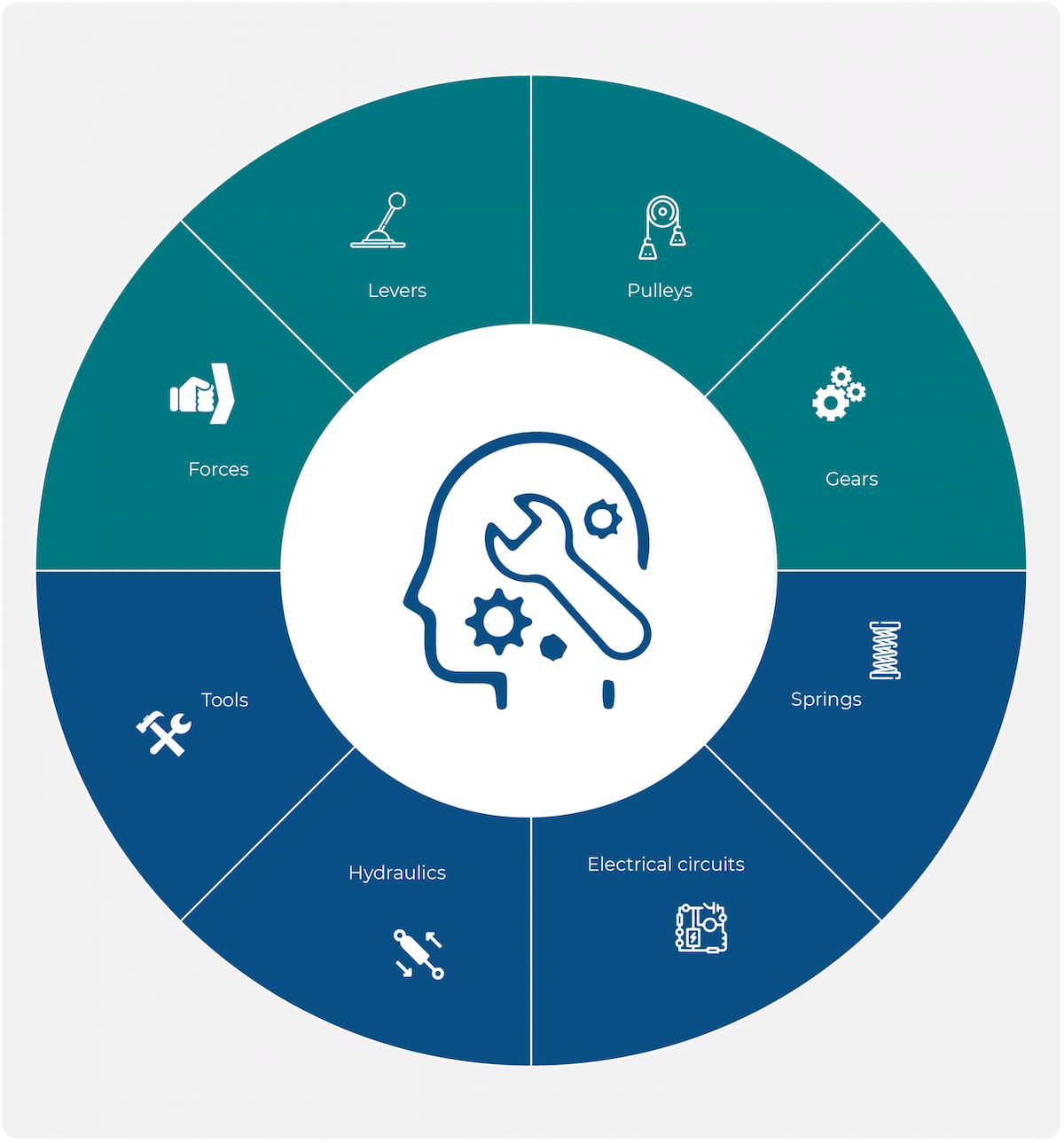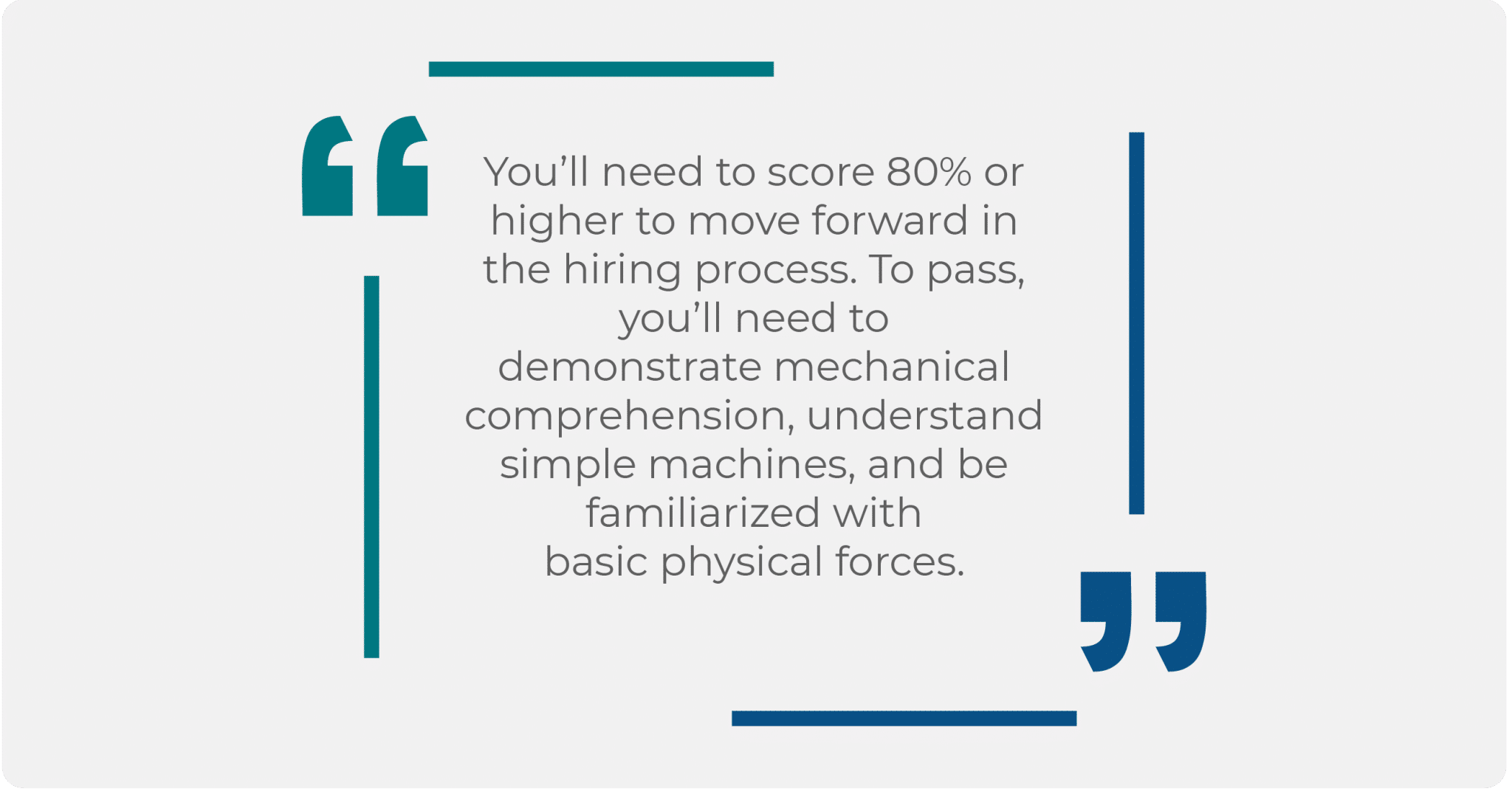Overview of the Wiesen Test of Mechanical Aptitude (WTMA)
Welcome to the world of the Wiesen Test of Mechanical Aptitude (WTMA), a pivotal tool in assessing mechanical aptitude. This test isn’t just about answering questions; it’s a measure of your innate ability to understand and apply mechanical concepts. With 60 items to be completed in 30 minutes, the WTMA challenges you to demonstrate your prowess in operating, maintaining, and understanding machinery and equipment. It’s designed to be fair, with content aimed at minimizing gender and racial bias, and it’s accessible, requiring only a sixth-grade reading level.
Importance in the Industry
Why does the WTMA matter? In industries like manufacturing, engineering, and construction, mechanical aptitude isn’t just desirable—it’s essential. The WTMA isn’t merely a test; it’s a predictor of your potential success in roles that demand mechanical skills. Companies rely on it to find the best fits for positions like machine operators, electricians, and mechanics. Scoring well on the WTMA can open doors to these career paths, marking you as a candidate with the right mechanical insight. So, taking this test seriously is not just about passing an exam; it’s about unlocking your potential in a mechanically-driven career landscape.
Table of Contents
- Understanding the WTMA
- Test Structure and Content
- Scoring and Interpretation
- Validity and Reliability
- Preparation Tips for the WTMA
- The WTMA and Your Career
- Conclusion
- FAQs
- Further Reading and Resources
1. Understanding the WTMA
Purpose and Application
The Wiesen Test, formally known as the Wiesen Test of Mechanical Aptitude (WTMA), is designed to measure an individual’s mechanical aptitude. This encompasses the ability to understand and work with machinery and equipment, focusing not just on current skills but also on the potential to learn and master new mechanical tasks. The WTMA is a powerful tool for predicting job performance in roles that require mechanical knowledge, such as operating, maintaining, or servicing tools and equipment. Its development aimed to address the limitations of earlier mechanical aptitude tests, ensuring a more equitable assessment across different demographic.
Who Should Take the WTMA?
The WTMA is highly recommended for individuals aiming for careers where mechanical skills are essential. This includes machine operators, electricians, construction workers, field service technicians, and mechanics. It’s an ideal test for those who are entering these fields for the first time or for experienced professionals seeking to demonstrate their mechanical aptitude to potential employers. The WTMA serves as a benchmark for assessing and validating mechanical skills, making it a crucial step for anyone looking to establish or advance their career in industries where mechanical understanding is a key component of job performance.

2. Test Structure and Content
Components of the Test
The WTMA is structured as a 30-minute test consisting of 60 questions. Each question is crafted to evaluate your understanding of mechanical principles and your ability to apply them practically. The test is designed with a focus on real-world mechanical situations rather than theoretical knowledge, ensuring that it assesses practical aptitude in a relevant and meaningful way.
Types of Questions
Questions in the Wiesen Test typically revolve around basic mechanical concepts like levers, pulleys, gears, and simple electrical circuits. These are not just random mechanical questions but are carefully selected to gauge how well you can understand and interact with common mechanical systems. The test does not require advanced knowledge of mechanics; rather, it assesses your ability to learn and apply basic mechanical principles in everyday scenarios, making it suitable for a wide range of applicants with varying levels of expertise.
3. Scoring and Interpretation
How Scoring Works
In the WTMA, your performance is quantified in two ways: a raw score and a percentile ranking. The raw score is straightforward – it’s the number of questions you answer correctly out of the 60 presented. This score is a direct reflection of your mechanical aptitude as assessed by the test.
Understanding Your Percentile Ranking
The percentile ranking is where things get interesting. This score positions you in relation to other test takers. For example, a percentile ranking of 60 means you scored better than 60% of the individuals who have taken the test. This ranking provides a relative measure of your mechanical aptitude compared to a broader population. It’s a crucial metric, especially in competitive fields, as it offers potential employers a clear benchmark of where you stand in a pool of candidates. Understanding where you fall on this percentile scale can give you valuable insight into your standing and areas where you might need improvement.
4. Validity and Reliability
Construct Validity
The WTMA has been shown to have strong construct validity. This means that the test effectively measures what it claims to measure – mechanical aptitude. Studies have demonstrated high correlations (.70 to .80) between the WTMA and other established mechanical aptitude tests, like the Bennett Mechanical Comprehension Test. This strong correlation underscores the WTMA’s effectiveness in assessing mechanical understanding and reasoning.
Adverse Impact and Gender Bias
One of the key strengths of the WTMA is its minimized adverse impact, particularly regarding gender bias. The test has been specifically designed and revised to reduce differences in performance based on gender, making it a more equitable measure of mechanical aptitude across different demographics.
Criterion-Related Validity
Criterion-related validity refers to the extent to which the test predicts outcomes it’s supposed to predict. In the case of the WTMA, research has shown that it effectively predicts performance in roles requiring mechanical skills. For instance, in a study involving carpet manufacturing operators, the WTMA had a notable validity coefficient, indicating a significant correlation between test scores and job performance as evaluated by supervisors. This aspect of validity is crucial as it demonstrates the WTMA’s practical utility in predicting job performance in mechanical roles.

5. Preparation Tips for the WTMA
Study Strategies
To excel in the WTMA, focus on understanding basic mechanical principles. Review topics like levers, pulleys, gears, and basic electrical concepts. Remember, the test assesses your ability to learn and apply these principles, not just memorize facts. Try to visualize and comprehend how different mechanical systems work in real-life scenarios. Practice tests can be extremely beneficial. They not only familiarize you with the test format but also help you identify areas where you need more focus.
Practice Resources
There are various resources available for WTMA preparation. Look for study guides and practice tests specifically designed for the WTMA. Online platforms often offer sample questions and tests that mimic the actual test environment. Additionally, consider engaging with basic mechanical tools and kits, as hands-on experience can significantly enhance your understanding. Leveraging these resources effectively can boost your confidence and performance in the actual test.
6. The WTMA and Your Career
How the WTMA Influences Hiring Decisions
The WTMA plays a significant role in hiring decisions in industries where mechanical skills are crucial. Employers view it as a reliable indicator of a candidate’s potential in mechanical roles. A high score can set you apart, showcasing your aptitude for understanding and working with mechanical systems. In many cases, it’s the deciding factor between candidates with similar qualifications, serving as a testament to your practical mechanical skills.
Testimonials from Industry Professionals
Professionals in fields like manufacturing, engineering, and maintenance often attest to the relevance of the WTMA in their career paths. Many highlight how their WTMA scores were instrumental in landing their first job or advancing in their careers. These testimonials underline the test’s importance, not just as a requirement, but as a tool that genuinely reflects one’s mechanical skill set and potential in a professional setting.
7. Conclusion
Recap and Final Thoughts
The Wiesen Test of Mechanical Aptitude (WTMA) is more than just a test; it’s a critical step in your professional journey in mechanical fields. It evaluates your ability to understand and work with mechanical concepts, a skill highly valued in many industries. Excelling in the WTMA can significantly influence your career prospects, distinguishing you in a competitive job market.
For those preparing to take the WTMA, consider leveraging resources like the iPREP Mechanical Aptitude Test. Such courses are designed to give you a comprehensive understanding of the test and enhance your mechanical aptitude. Remember, the WTMA is not just assessing what you know, but your potential to learn and grow in mechanical roles. With the right preparation and mindset, you can turn this test into a stepping stone for your career advancement.

8. FAQs
Common Questions About the WTMA
What is the WTMA?
- The Wiesen Test of Mechanical Aptitude (WTMA) is a test designed to measure mechanical aptitude, specifically the ability to learn and work with mechanical systems.
Who should take the WTMA?
- It’s ideal for individuals seeking roles in mechanical, manufacturing, or engineering fields, such as machine operators, electricians, and mechanics.
How long is the WTMA, and how many questions does it have?
- The WTMA is a 30-minute test consisting of 60 questions.
What types of questions are on the WTMA?
- The questions focus on basic mechanical concepts like levers, pulleys, gears, and basic electrical circuits.
How is the WTMA scored?
- You receive a raw score based on correct answers and a percentile ranking comparing your performance to others.
Can the WTMA score influence my job prospects?
- Yes, a good score on the WTMA can significantly enhance your attractiveness to potential employers in mechanical and technical fields.
9. Further Reading and Resources
Additional Information on Mechanical Aptitude Tests
For those looking to delve deeper into the world of mechanical aptitude tests, there’s a wealth of information and resources available. Expanding your understanding of these tests, their structure, and the concepts they cover can be highly beneficial.
- iPREP Mechanical Aptitude Course: Consider enrolling in the iPREP course, which offers comprehensive preparation for mechanical aptitude tests like the WTMA. These courses provide valuable insights, practice questions, and strategies to improve your performance.
- Online Forums and Communities: Engaging with online forums and communities where industry professionals and past test-takers share their experiences can be enlightening.
- Books and Guides: There are several books and study guides dedicated to mechanical aptitude tests. They often include sample questions, detailed explanations, and tips for test-taking.
- Educational Websites: Websites focusing on mechanical engineering and related fields can offer practical knowledge and examples, helping you understand mechanical concepts in real-world contexts.
Remember, the key to excelling in tests like the WTMA lies in a combination of theoretical knowledge and practical understanding. Utilizing these resources can significantly aid in your preparation.
























